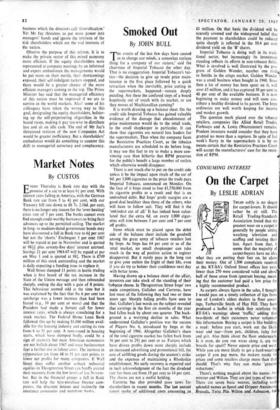Market Notes
By CUSTOS
EVERY Thursday is Bank rate day with the promise of a cut to at least 63 per cent. With interest rates falling in America, with the German Bank rate cut from 5 to 43 per cent, with our Treasury bill rate down to £6 7s. 2.16d. per cent, there is no longer any reason for the 'over-heating' crisis rate of 7 per cent. The banks cannot even find enough credit-worthy borrowers to bring their advances up to the permitted ceiling. The market in long- to medium-dated government bonds may have discounted a fall in Bank rate to 63 per cent but not the 'shorts.' Exchequer 5 per cent 1967 will be repaid at par in November and is quoted at 9841 plus seventy-five days' interest accrued. Savings 23 per cent 1964-67 will be repaid at par on May 1 and is quoted at 983. There is £749 million of this stock outstanding and the market is daily expecting a funding issue to replace it.
Wall Street slumped 11 points in hectic trading when it first heard of the tax increase in the State of the Union message and then rebounded sharply, ending the day with a gain of 8 points. This behaviour seemed odd at the time but it was explained by the fact that the 6 per cent tax surcharge was a lower increase than had been feared (e.g., 10 per cent or more) and that the President had made a fervent call for lower interest rates, which is always stimulating for a stock market. The Federal Home Loan Bank followed this up by making $1,000 million avail- able for the housing industry and cutting its rate from 6 to 53 per cent. A turn-round in housing starts, which have slumped badly, could be a sign of recovery but most American economists are not bullish about 1967 and most businessmen fear a further rise in labour cosB. The increase in corporation tax from 48 to 51 per cent points to lower net profits for many companies. If Wall Street does suffer another setback industrial equities in Throgmorton Street can hardly extend their recovery from the low levels of last Novem- ber. But in the financial groups a fall in Bank rate will help the hire-purchase finance com- panies. the discount houses and indirectly the insurance comoanies and merchant hanks.


































 Previous page
Previous page